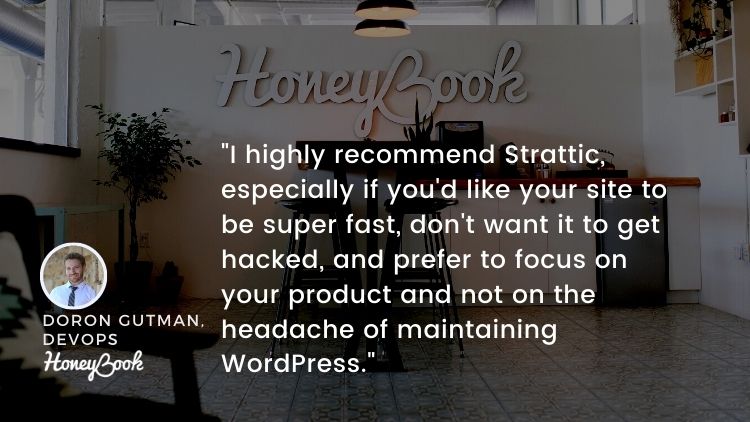About HoneyBook
HoneyBook is the leading client experience and business management platform for service-based small businesses and freelancers. By combining tools like billing, contracts and client communication, HoneyBook helps business owners get organized so they can provide top-tier service at every step.
Steadily growing, HoneyBook has tens of thousands of customers and over $3 billion in business booked through the platform.
HoneyBook also empowers its 75,000-strong dedicated community of small business owners across the US and Canada with free business education and resources on their WordPress site, RisingTide.
Challenges with legacy WordPress hosting
Unexpected maintenance issues
While HoneyBook’s main site is configured using a serverless stack, their community-focused website, RisingTide, is built with WordPress, and sits in a subfolder /risingtide/. While hosting their site with a standard WordPress hosting provider, this subfolder setup proved problematic and required Doron Gutman, DevOps at HoneyBook, to deal with a whole host (haha) of unexpected maintenance issues that arose.
Doron shares, “Our subfolder setup always required a lot of unexpected maintenance such as special handling for the SSL certificate, and dealing with annoying cookie-related error messages. And then of course, there were upgrades and a lot of stuff that I had to handle, even though WordPress itself is not a part of what I do.”
Unexpected CPU limits
As RisingTide added more content and garnered more readers, traffic to the site started to take off, which was great, but the site suddenly started experiencing CPU-related server errors.
Doron says, “There was this frustrating metric that the hosting provider would use to calculate how much CPU processing we had over a month. As a result, as soon as we would get peaks in traffic, we would start seeing errors related to CPU usage.”
FinTech-related security concerns
In addition to maintenance headaches and unforeseen server limits, the possibility of getting hacked weighed heavily on Doron’s mind.
As part of the FinTech industry, Doron says “our WordPress site is an obvious place to try to attack us. And if we were to get hacked with a malicious file, that would be a dangerous loss for us.”
Sub-par performance for site visitors and Google
Visitors to the RisingTide were experiencing sub-par page speed, specifically for the “time to interactive” metric which is how long users have to wait until they can actually click around or interact with the website. Google looks at performance metrics like this one to determine the user’s experience on a site.
And, in Google’s eyes, a faster site means better user experience which in turn means ranking better in search results. Doron shares, “The user experience for our marketing materials on RisingTide was less than perfect in terms of the speed itself. And we noticed that Google was not crawling enough pages.”
Going static with WordPress for optimal user experience
As the frustrations with their hosting setup increased, Doron started looking for ways to solve their WordPress-related issues. HoneyBook had already experienced the power and security of a static and serverless architecture for their main site, so when they heard that Strattic can convert WordPress sites into static and Jamstack sites, they knew this was the direction they wanted to take.
No database to attack
Since Strattic serves the public-facing website as HTML files distributed fully via a CDN, there is no WordPress database to attack. Doron says, “It’s a great weight off my chest to know that when people and bots visit the site, it’s just a plain HTML file, and there’s no longer a WordPress login on the public side. I’m still seeing tons of attempts to go to the WP login, and I know it’s just a dead-end, because there’s nothing to find there.“
No maintenance headaches
Doron enjoys another benefit of separating the WordPress site from the static output and says, “Now that the WP admin pages are on a different domain, we don’t have any of the setup or maintenance headaches that we had before – it’s been a great relief for us.”
Faster site and increased Google crawl budget
In terms of performance and user experience, which is of utmost importance to HoneyBook, RisingTide now has faster page load times on Strattic, and has increased their Google crawl budget so more pages are getting indexed.
No CPU limitations
And finally, as RisingTide works hard to reach and grow their community, they can do so feeling confident that new visitors will have an optimal experience on their site. Because of Strattic’s architecture, their site will never experience another CPU limit and will always serve their site quickly and reliably, without ever having to lift a finger.




